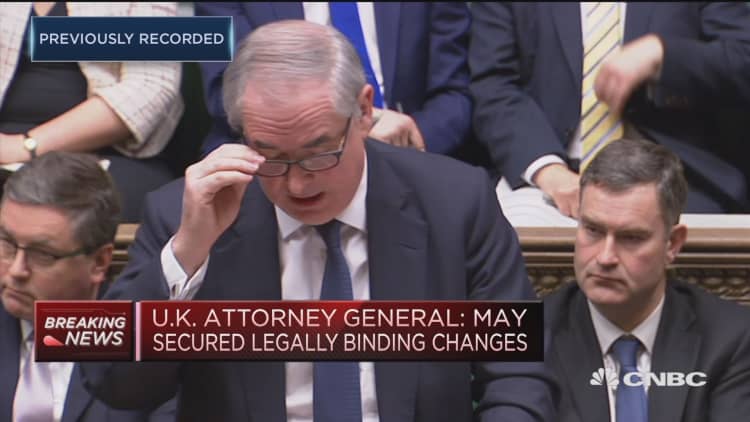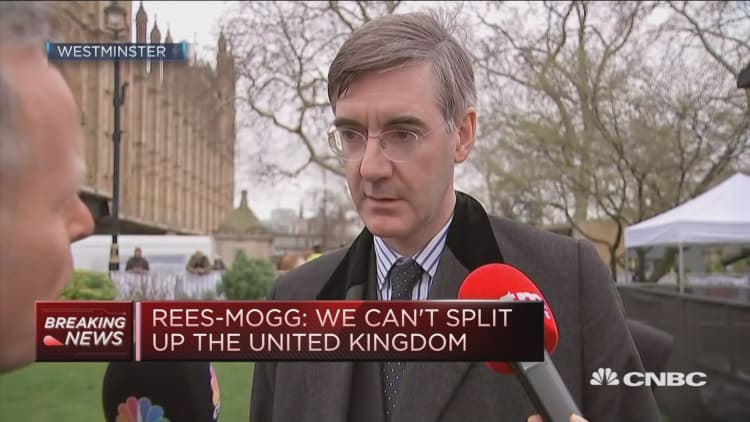Prime Minister Theresa May looks to have failed in her attempt to win over U.K. lawmakers, with members of her own party saying they will once again reject her Brexit withdrawal deal.
It's expected her Brexit plan will not receive enough votes to be approved on Tuesday evening, following criticism from euroskeptics and Northern Ireland's Democratic Unionist Party (DUP), whose support was seen as crucial for it to be passed.
The deal has already been roundly rejected by U.K. lawmakers once, in January, with many MPs worried about a part of the withdrawal agreement that aimed to prevent a hard border between the Republic of Ireland and Northern Ireland (which is a part of the U.K.) should the EU and U.K. fail to agree a trade deal in a 21-month transition period.
MPs didn't like the fact that the Irish backstop, although intended as a last-resort, would mean the U.K. remaining within a EU customs union for an indefinite amount of time and unable to leave unilaterally.
In a last-ditch attempt to allay those concerns and to persuade skeptical Brexiteers to accept her deal, May traveled to Strasbourg Monday night and said she had won "legally binding" assurances from the EU over the backstop and called on MPs to back her "improved" deal.

But a big blow was dealt to the deal's prospects at midday on Tuesday, with the government's chief legal adviser giving a lukewarm endorsement of the new legal assurances.
Attorney General Geoffrey Cox said in a statement Tuesday that while the legal assurances "reduced the risk that the U.K. could be indefinitely and involuntarily detained within the backstop" the legal risk "remains unchanged that the U.K. would have no internationally lawful means of exiting the Protocol's (backstop) arrangements, save by agreement," — that is, by mutual consent. The pound fell sharply after his statement.
May needs to win over the most ardent Brexiteers within her own Conservative party who belong to a euroskeptic European Research Group (ERG) and the Northern Irish party that supports her government and gives it a slim majority in parliament, the DUP.
However, by Tuesday afternoon, and after Cox's statement, the DUP and ERG indicated they would both reject the deal. A spokesman for the DUP clarified that the party believed that "sufficient progress" had not been made at this time. He said the party would support "the right deal which respects the referendum result."

Jacob Rees-Mogg, who chairs the ERG, had told CNBC earlier on Tuesday that the group's own committee of lawyers was scrutinizing the assurances and added that the DUP's point of view was very important to how the tweaked deal would be voted upon.
"The view of our fellow unionists is very important. We cannot split up the United Kingdom," he said Tuesday morning, adding that if the DUP were unhappy with the deal on offer "most unionists within the Conservative party will support the DUP" and would vote against the deal.
May resolutely defended her plan when speaking in front of the House of Commons just hours before the vote. "If this vote is not passed tonight, if this deal is not passed, then Brexit could be lost," a hoarse-voiced May said.
If lawmakers vote against the deal Tuesday evening — as is now believed to be the most likely scenario following contentious legal advice on the deal — they will then get to vote on Wednesday and Thursday, respectively, on whether the U.K. should leave the 28-member bloc with no deal, or should request a delay to its departure, scheduled for March 29.
There is increasing weariness on the continent with Brexit. European Commission President Jean-Claude Juncker has already warned "there will be no third chance" and "no further interpretations of the interpretations; no further assurances of the re-assurances — if the meaningful vote (on Tuesday) fails."


